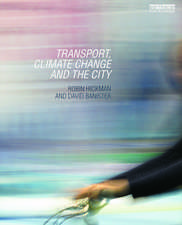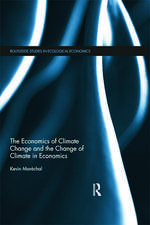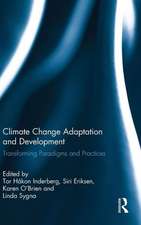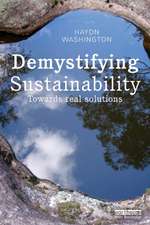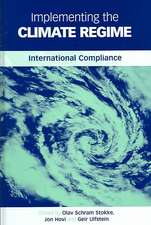Toward a New Climate Agreement: Conflict, Resolution and Governance: Routledge Advances in Climate Change Research
Editat de Todd Cherry, Jon Hovi, David M. McEvoyen Limba Engleză Paperback – 4 feb 2016
This book brings together leading experts to speak to such questions and to offer promising ideas for the path toward a new climate agreement. Organized in three main parts, it examines the potential for meaningful climate cooperation. Part 1 explores sources of conflict that lead to barriers to an effective climate agreement. Part 2 investigates how different processes influence states’ prospects of resolving their differences and of reaching a climate agreement that is more effective than the current Kyoto Protocol. Finally, part 3 focuses on governance issues, including lessons learned from existing institutional structures.
The book is unique in that it brings together the voices of experts from many disciplines, such as economics, political science, international law, and natural science. The authors are academics, practitioners, consultants and advisors. Contributions draw on a variety of methods, and include both theoretical and empirical studies. The book should be of interest to scholars and graduate students in the fields of economics, political science, environmental law, natural resources, earth sciences, sustainability, and many others. It is directly relevant for policy makers, stakeholders and climate change negotiators, offering insights into the role of uncertainty, fairness, policy linkage, burden sharing and alternative institutional designs.
| Toate formatele și edițiile | Preț | Express |
|---|---|---|
| Paperback (1) | 489.26 lei 6-8 săpt. | |
| Taylor & Francis – 4 feb 2016 | 489.26 lei 6-8 săpt. | |
| Hardback (1) | 1174.67 lei 6-8 săpt. | |
| Taylor & Francis – 19 feb 2014 | 1174.67 lei 6-8 săpt. |
Din seria Routledge Advances in Climate Change Research
-
 Preț: 152.55 lei
Preț: 152.55 lei -
 Preț: 311.14 lei
Preț: 311.14 lei -
 Preț: 280.92 lei
Preț: 280.92 lei - 8%
 Preț: 376.64 lei
Preț: 376.64 lei -
 Preț: 310.75 lei
Preț: 310.75 lei -
 Preț: 207.00 lei
Preț: 207.00 lei -
 Preț: 309.87 lei
Preț: 309.87 lei -
 Preț: 310.55 lei
Preț: 310.55 lei -
 Preț: 312.54 lei
Preț: 312.54 lei -
 Preț: 311.14 lei
Preț: 311.14 lei - 8%
 Preț: 383.81 lei
Preț: 383.81 lei -
 Preț: 288.80 lei
Preț: 288.80 lei -
 Preț: 296.73 lei
Preț: 296.73 lei -
 Preț: 482.62 lei
Preț: 482.62 lei -
 Preț: 406.42 lei
Preț: 406.42 lei -
 Preț: 478.77 lei
Preț: 478.77 lei - 18%
 Preț: 1000.27 lei
Preț: 1000.27 lei -
 Preț: 449.41 lei
Preț: 449.41 lei -
 Preț: 449.41 lei
Preț: 449.41 lei - 12%
 Preț: 325.34 lei
Preț: 325.34 lei - 18%
 Preț: 1172.58 lei
Preț: 1172.58 lei - 18%
 Preț: 1001.84 lei
Preț: 1001.84 lei - 18%
 Preț: 1074.44 lei
Preț: 1074.44 lei -
 Preț: 408.16 lei
Preț: 408.16 lei -
 Preț: 449.41 lei
Preț: 449.41 lei - 26%
 Preț: 765.04 lei
Preț: 765.04 lei -
 Preț: 408.74 lei
Preț: 408.74 lei -
 Preț: 299.52 lei
Preț: 299.52 lei - 18%
 Preț: 701.56 lei
Preț: 701.56 lei - 26%
 Preț: 819.48 lei
Preț: 819.48 lei - 18%
 Preț: 1057.09 lei
Preț: 1057.09 lei - 18%
 Preț: 1055.51 lei
Preț: 1055.51 lei - 18%
 Preț: 1053.92 lei
Preț: 1053.92 lei -
 Preț: 416.22 lei
Preț: 416.22 lei - 18%
 Preț: 1053.16 lei
Preț: 1053.16 lei - 26%
 Preț: 847.73 lei
Preț: 847.73 lei - 25%
 Preț: 851.82 lei
Preț: 851.82 lei -
 Preț: 413.94 lei
Preț: 413.94 lei - 18%
 Preț: 1000.27 lei
Preț: 1000.27 lei - 18%
 Preț: 1226.79 lei
Preț: 1226.79 lei -
 Preț: 449.41 lei
Preț: 449.41 lei - 18%
 Preț: 1059.45 lei
Preț: 1059.45 lei - 26%
 Preț: 764.20 lei
Preț: 764.20 lei
Preț: 489.26 lei
Nou
Puncte Express: 734
Preț estimativ în valută:
93.63€ • 97.20$ • 78.07£
93.63€ • 97.20$ • 78.07£
Carte tipărită la comandă
Livrare economică 22 martie-05 aprilie
Preluare comenzi: 021 569.72.76
Specificații
ISBN-13: 9781138656567
ISBN-10: 1138656569
Pagini: 328
Dimensiuni: 156 x 234 x 18 mm
Greutate: 0.45 kg
Ediția:1
Editura: Taylor & Francis
Colecția Routledge
Seria Routledge Advances in Climate Change Research
Locul publicării:Oxford, United Kingdom
ISBN-10: 1138656569
Pagini: 328
Dimensiuni: 156 x 234 x 18 mm
Greutate: 0.45 kg
Ediția:1
Editura: Taylor & Francis
Colecția Routledge
Seria Routledge Advances in Climate Change Research
Locul publicării:Oxford, United Kingdom
Public țintă
PostgraduateCuprins
PART I: CONFLICT: BARRIERS TO A NEW AGREEMENT 1. Observations from the climate negotiations in Durban, South Africa 2. Does fairness matter in international environmental governance 3. Formation of climate agreements: The role of uncertainty and learning 4. Burden sharing in global climate governance 5. Negotiating to avoid ‘gradual’ versus ‘dangerous’ climate change: An experimental test of two prisoners’ dilemmas 6. U.S. climate policy and the shale gas revolution PART 2:RESOLUTION: PATHS TOWARD A NEW AGREEMENT 7. The role of inequality in international environmental agreements with endogenous minimum participation requirements 8. Climate policy coordination through institutional design: an experimental examination 9. Improving the design of international environmental agreements 10. Managing dangerous anthropogenic interference: decision rules for climate governance 11. Exclusive approaches to climate governance: More effective than the UNFCCC? 12. Bottom up or top down PART 3:GOVERNANCE: STRUCTURES FOR A NEW AGREEMENT 13. Rethinking the legal form and principles of a new climate agreement 14. Technology agreements with heterogenous countries 15. International guidance for border carbon adjustments to address carbon leakage 16. The effect of enforcement in the presence of strong reciprocity: an application of agent-based modeling 17. EU emissions trading: achievements, challenges, solutions 18. The EU’s quest for linked carbon markets: turbulence and headwind
Descriere
This book examines the challenges of sustaining meaningful cooperation among countries striving to manage global climate change through international environmental agreements. Through the perspectives of leading international scholars from multiple disciplines, readers of the book will gain an understanding of how agreements are negotiated, the strength and weaknesses of previous climate agreements and how a more effective future climate agreement can be designed.







